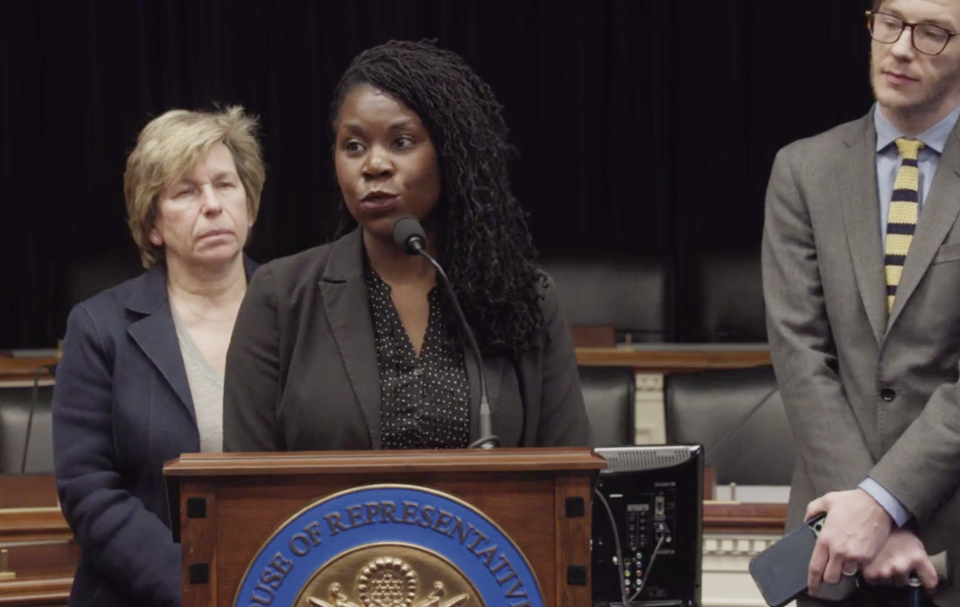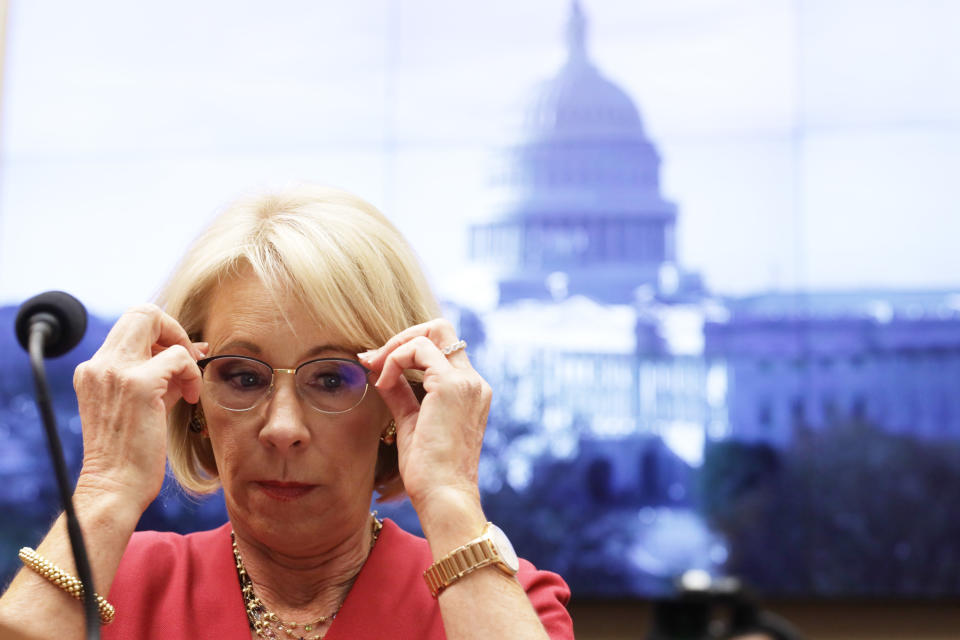‘They destroyed us’: Defrauded student loan borrower decries DeVos policies
Education Secretary Betsy DeVos testified on Capitol Hill on Thursday, defending her department’s position on how it granted debt relief claims to more than 200,000 defrauded borrowers. The same day, one borrower pleaded with her to stop stalling.
“I want you all to understand that this is real. And I know a lot of people don't understand that this is real,” Keishana Mahone said, speaking at a meeting organized by the American Federation of Teachers (AFT). “They changed our lives. They destroyed us. And now I'm sitting here, a year later, not knowing what to do, not knowing how to pick up and go.”
Mahone, who started attending the Illinois Institute of Art in Chicago in 2017 to pursue a degree in graphic design, said the for-profit school unexpectedly closed the following year. The parent company, Dream Center Education Holdings, lost accreditation in January 2018.
“Once they lost their accreditation, well, we shouldn't have been responsible for the debt that was encouraged to continue to incur,” said Mahone. “I did my part. I went to school, I applied myself. I sacrificed, I committed. I stand here today with no bachelor's degree. But I have debt — debt that I was told doesn't mean anything to them. I was denied the closed school discharge. I was denied to have my loans relieved.”

‘I later learned that I was on the wrong payment plan’
Mahone was accompanied by two other borrowers who were also having trouble seeking debt relief.
Gloria Nolan Evans, who is a teacher and a plaintiff in a lawsuit that the AFT has filed against ED over its failure to effectively carry out the Public Service Loan Program (PSLF), shared how her debt had grown despite her diligently paying it off.
“I left college with a master's degree in 2005,” said Evans. “At that time, I had $62,000 worth of student loan debt. Today, I still owe $58,000 in student loan debt. I have been paying the entire time.”
The PSLF program was open to federal student loan borrowers who have worked full-time in the public or nonprofit sector for 10 years and have made 120 on-time monthly payments in a qualifying repayment plan. The government theoretically forgives the rest.
Evans added that being a teacher since 2005 — the year PSLF was introduced — was an opportunity to make good on her debts.
“At that time, I called my then loan servicer to inquire about the program,” she said. “And I was told by the person on the other end, you need to make 120 payments … [so] I thought, 'Well, okay, I'm going to follow this, this guidance that I've been given and continue making my payments.’ I later learned that I was on the wrong payment plan — and had been for six years — and so those payments wouldn't be counted.”

‘It was confusing and burdensome’
Matthew Cortland, a health care lawyer, also shared his experience facing difficulties trying to get debt relief due to his disability.
“There are some 200,000 people who have been found by the Social Security Administration to be disabled. And it's really important that we're clear that the Social Security Administration's Disability determination progress is extremely rigorous,” Cortland said.
In 2018, only 35% of disability applications were approved by the Social Security Administration, according to data from the agency’s disability program.
And under federal law, a person with student loans who has a disability can apply for a total and permanent disability (TPD) discharge to relieve their debt.
However, an NPR investigation recently revealed how hundreds of thousands of potential borrowers who are entitled to the discharge are being kept from that relief.
“Some of those [claims] were approved only after the claimant got before an administrative law judge, lawyered up, went through the whole process, waited years,” Cortland said. He added that the ED, in adding more requirements for debt discharge after the fact, “wants to make those disabled borrowers jump through even more bureaucratic hoops.”
Furthermore, according to Cortland, proving “a disability to the Department of Education using its own form is not easy. I know as a disabled borrower, I've done it myself. It was confusing and burdensome. And I was ultimately only able to navigate that process because I'm a health care lawyer.”
—
Aarthi is a writer for Yahoo Finance. She can be reached at [email protected]. Follow her on Twitter @aarthiswami.
Read more:
DeVos says Obama 'weaponized' rules created for defrauded students
Student loan reform group sues Education Secretary Betsy DeVos and CFPB Director Kathy Kraninger
Read the latest financial and business news from Yahoo Finance
Follow Yahoo Finance on Twitter, Facebook, Instagram, Flipboard, SmartNews, LinkedIn, YouTube, and reddit.
